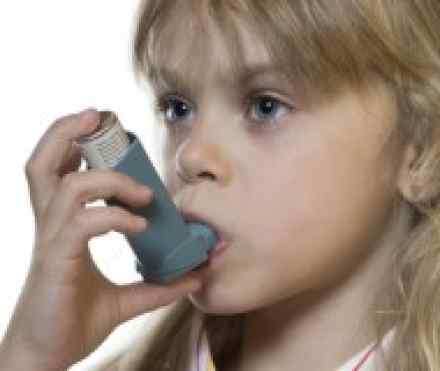In some children, unmanaged asthma can cause serious or even life-threatening asthma attacks.
Common childhood asthma symptoms include:
-
Coughing
-
A whistling or wheezing sound when exhaling
-
Shortness of breath
-
Chest congestion or tightness
Other signs and symptoms of asthma in children include:
-
Trouble sleeping caused by shortness of breath, coughing or wheezing
-
Bouts of coughing or wheezing that get worse with a respiratory infection such as a cold or the flu
-
Delayed recovery or bronchitis after a respiratory infection
-
Fatigue or trouble breathing during active play or exercise — signs of exercise-induced asthma
Asthma signs and symptoms vary from child to child, and may get worse or better over time. While wheezing is most commonly associated with asthma, not all children with asthma wheeze. Your child may have only one sign or symptom, such as a lingering cough or chest congestion.
Sometimes it's difficult to tell whether your child's symptoms are caused by asthma. Wheezing episodes and other asthma-like symptoms may be caused by infectious bronchitis or other respiratory problem.
Causes
In children with asthma, an overly sensitive immune system makes airways become inflamed and swollen when exposed to triggers such as smoke or allergens. Sometimes, asthma symptoms occur with no apparent triggers. When asthma flares up, airway muscles constrict, the lining of the airways swell, and thick mucus fills the bronchial tubes, leading to asthma symptoms.
Asthma triggers differ from child to child and include:
-
Viral infections such as the common cold
-
Allergens such as dust mites, pet dander, pollen or mold
-
Tobacco smoke or other environmental pollutants
-
Exercise
Weather changes or cold airConditions linked to asthma include:
-
A chronic runny or stuffy nose (rhinitis)
-
Inflamed sinuses (sinusitis)
-
Heartburn (gastroesophageal reflux disease)
Risk factors
It isn't clear why some children get asthma and others don't, but it's probably due to a combination of genetic (inherited) and environmental factors. Children with a family history of asthma are at greater risk of developing the disease. Other environmental factors that may increase your child's chances of developing asthma include:
-
Exposure to tobacco smoke
-
Previous allergic reactions, including skin reactions, food allergies or allergic rhinitis (hay fever)
-
Living in a large urban area with increased exposure to air pollution
-
A family history of asthma, allergic rhinitis, hives or eczema
-
Low birth weight
-
Obesity
Complications
Asthma may cause a number of complications, including:
-
Severe asthma attacks that require emergency room visits or even hospitalization
-
Permanent narrowing of the bronchial tubes (airway remodeling)
-
Side effects from long-term use of some medications used to stabilize severe asthma (oral corticosteroids)
-
Slightly slowed growth in children caused by long-term use of inhaled corticosteroids
Diagnosis
Asthma is a very individual condition. Your child's doctor will consider the nature and frequency of symptoms along with results from tests to rule out other diseases before diagnosing asthma.
First, the doctor will ask for a detailed description of your child's symptoms and ask about your family history of asthma or allergic diseases such as eczema, hives or allergic rhinitis (hay fever).
-
In children 6 years of age and older, doctors diagnose asthma with the same tests used to identify the disease in adults. Lung function tests (spirometry) measure how quickly and how much air your child can exhale. Your child may have pulmonary function tests at rest, after exercising and after taking asthma medication. Allergy tests also may be part of the evaluation.
-
In younger children, diagnosis can be difficult because lung function tests aren't accurate before 6 years of age. Some children also simply outgrow asthma-like symptoms over time. Your doctor will rely on detailed information about symptom type and frequency when considering an asthma diagnosis in a young child. Sometimes a diagnosis is not made until later, after months or years of observing symptoms.
If you suspect your child has asthma, it's important to start the testing process early. Early diagnosis and proper treatment can prevent disruptions from daily activities such as sleep, play, sports and school. It may also prevent dangerous or even life-threatening asthma attacks.
For children younger than age 3 who have symptoms of asthma, many times doctors will use a "wait-and-see" approach. This is because the long-term effects of asthma medication on infants and young children aren't clear. If an infant or toddler has frequent or severe wheezing episodes, a course of medication may be prescribed to see if the wheezing improves symptoms.
References:
https://www.asthma.ie/
https://en.wikipedia.org/wiki/Asthma
http://www.nhlbi.nih.gov/health/health-topics/topics/asthma
http://hse.ie/eng/health/az/A/Asthma/
http://www.asthmacare.ie/












